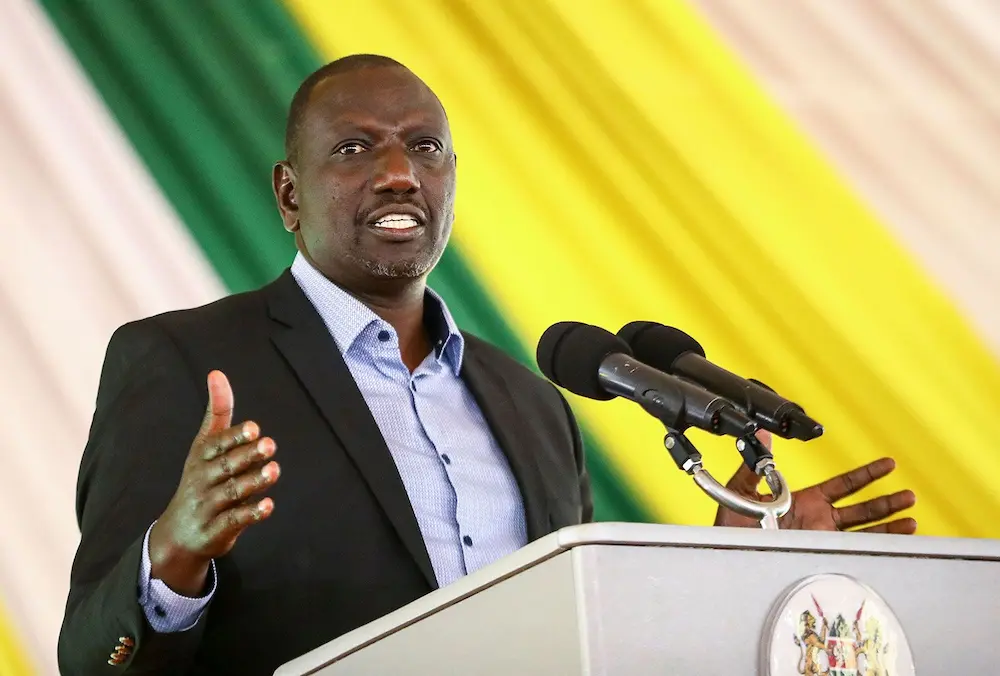
Dr. William Ruto; source | reuters.com
William Ruto’s Company Lands Lucrative Government Contracts: What Does This Mean for Shareholders?
The Shocking News That’s Shaking Up the Business World!
Have you ever wondered how some companies seem to have the Midas touch when it comes to winning government contracts?
Well, brace yourselves!
A company co-owned by none other than President William Ruto has just scored a jackpot of multi-million shilling government tenders.
Yes, you heard that right!
The firm, known as the Kenya Commercial Bank (KCB) Group, recently announced the windfall, and it’s making headlines across Kenya.
But what’s really exciting is how this could impact shareholders and the wider economy.
Buckle up, because this story is packed with juicy details!
A Closer Look at the Contracts
The contracts awarded to KCB Group have a staggering value of over Ksh 4.5 billion.
That’s a number that many businesses would drool over!
The tenders include significant projects like the National Government’s Universal Healthcare Program and a housing initiative aimed at boosting affordable housing for Kenyans.
Talk about a solid double whammy!
Could this mean greener pastures for the company and its shareholders?
Ruto’s administration is putting its money where its mouth is, and this time it’s all about development and service delivery.
If you squint just right, you might even catch a glimpse of what could be a booming economy ahead!
What Do Experts Say About These Developments?
Analysts have crowded around this hot topic like moths to a flame.
According to financial experts, this announcement illuminates a new era of transparency and competitive bidding within the government sector.
“Such multi-million contracts signal a robust economy,” said one expert.
They further noted that when government contracts are awarded to established firms, it cultivates trust in public investments.
Now here’s a thought: could this trend lead us toward a future where more companies leap at the chance to work with the government?
One can only hope!
Shareholders Are Thrilled: A Potential Goldmine?
Now, let’s talk about the people who love this news the most – shareholders!
The value of KCB shares is expected to surge, much like a rocket taking off.
With the government contracts in hand, the prospect of dividends might just become a sweet reality.
Shareholders are rubbing their hands together in anticipation, asking, “What does this mean for our portfolios?”
If you’ve ever invested in a company that’s landed a big government contract, you know the thrill that comes with it.
Will this be the moment KCB becomes an unstoppable force on the stock exchange?
Could This Set a New Precedent for Government Contracts?
There’s more!
This isn’t just about one company and a few contracts; it’s the possibility that this could set a new business standard.
Could we witness more partnerships between successful private companies and the government?
You see, when influential figures like Ruto are publicly associated with such successful ventures, it can inspire other firms to step up their game, competing for those prized government contracts.
This could usher in an era where creativity and innovation thrive, ultimately benefiting the Kenyan economy.
So, are we on the brink of a transformation in government contracting policies?
Only time will tell!
The Bigger Picture: What’s Next for KCB Group?
As we unpack this news, it’s essential to keep our eyes on the elephant in the room – how will KCB manage its newfound power?
The pressure is now on for them to deliver exceptional services and results.
They have set a bar, and they must soar above it!
If they can meet, or even exceed, the expectations of the government and citizens, they’ll not only cement their reputation but also boost public confidence in the government’s projects.
Failure, on the other hand, could lead to a costly backlash.
It’s like walking a tightrope – exhilarating but risky!
Conclusion: Is This Just the Beginning?
To sum it all up, Ruto’s company hitting the jackpot with government contracts has sent shockwaves throughout the business landscape.
It raises important questions about the future of government contracting and what it means for shareholders and the economy as a whole.
As we navigate this exciting yet uncertain terrain, it’s clear one thing is for sure:
The eyes of the Kenyan economy are fixated firmly on KCB Group.
Will they rise to the occasion, or will this be a fluke?
What do you think?
This new chapter is just beginning, and we’ll all be watching closely!





